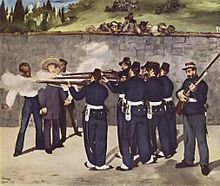Maximilian I of Mexico
| Maximilian I | |||||
|---|---|---|---|---|---|
 Maximilian, c. 1864 | |||||
| Emperor of Mexico | |||||
| Reign | 10 April 1864 – 19 June 1867 | ||||
| Predecessor | Monarchy established (Benito Juárez, as President of the Republic) | ||||
| Successor | Monarchy abolished (Benito Juárez, as President of the Republic) | ||||
| Prime ministers | |||||
| Born | Archduke Maximilian of Austria 6 July 1832 Schönbrunn Palace, Vienna, Austrian Empire, German Confederation | ||||
| Died | 19 June 1867 (aged 34) Cerro de las Campanas, Santiago de Querétaro, Restored Republic | ||||
| Burial | 18 January 1868 Imperial Crypt, Vienna, Austria | ||||
| Spouse | |||||
| |||||
| House | Habsburg-Lorraine | ||||
| Father | Archduke Franz Karl of Austria | ||||
| Mother | Princess Sophie of Bavaria | ||||
| Religion | Catholicism | ||||
| Signature | |||||
Maximilian I of Mexico (6 July 1832 – 19 June 1867) was a member of the Imperial House of Habsburg-Lorraine. After a distinguished career in the Austrian Navy he was proclaimed Emperor of Mexico, during the Second Mexican Empire.
His father was Archduke Franz Karl, the second surviving son of Emperor Francis II of Austria, during whose reign he was born.

Maximilian was thus a member of the House of Habsburg-Lorraine, a female-line cadet branch of the House of Habsburg. His older brother was the reigning Emperor Franz Joseph I of Austria and their mother was Princess Sophie of Bavaria, a member of the House of Wittelsbach.[1]
Many Europeans, and Viennese in particular, suspected that he was actually fathered by Napoleon II of France. There was a close relationship between Sophie and Napoleon II. It was said that Sophie never recovered after his death and that she blamed it on Metternich for the rest of her life.
Maximilian ruled as the Emperor of Mexico from 1864 to 1867. He was installed by occupying French forces under Napoleon III. When the French left in 1867, Maximilian refused to go with them, believing he had the support of the people.
Maximilian was shocked by the living conditions of the poor in contrast to the magnificent haciendas of the upper class. His wife Empress Carlota of Mexico began holding parties for the wealthy Mexicans to raise money for poor houses. One of Maximilian's first acts as Emperor was to restrict working hours and abolish child labour. He cancelled all debts for peasants over 10 pesos, restored communal property and forbade all forms of corporal punishment. He supported land reforms, religious freedom, and extending the right to vote beyond the landholding class. These liberal policies caused opposition from the wealthy and the landowners.
In addition, he was opposed by President Benito Juárez who supported native, democratic rule, under the banner of republicanism.

Maximilian was captured by Benito Juarez’s Republican forces and executed by firing squad on 19 June 1867.
References
[change | change source]- ↑ Palmer, Alan 1994. Twilight of the Habsburgs: the life and times of Emperor Francis Joseph. New York: Atlantic Monthly Press. ISBN 0-87113-665-1
